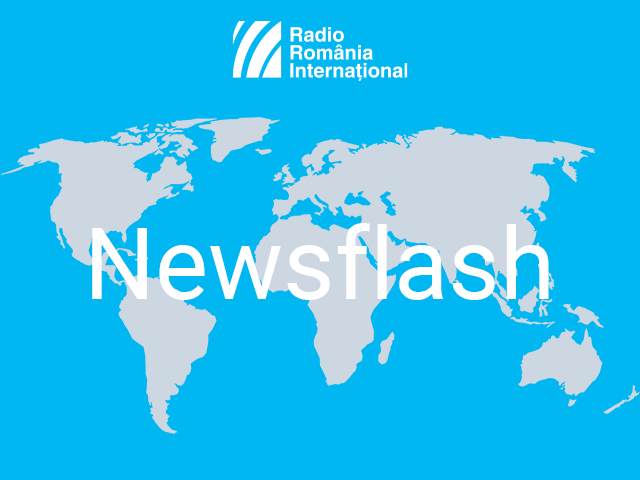December 21, 2023
A roundup of domestic and international news
Warning: Trying to access array offset on null in /home/web/rri.ro/public/wp-content/themes/rri/template-parts/content.php on line 53

Warning: Trying to access array offset on null in /home/web/rri.ro/public/wp-content/themes/rri/template-parts/content.php on line 98
Newsroom,
21.12.2023, 13:55
Commemoration. Memorial services are being held in Bucharest today for the heroes who died for freedom in the anti-communist Revolution 34 years ago. December 21, 1989 is considered the first day of the Revolution in the Capital, after the failed rally called by the dictator Nicolae Ceauşescu, followed by the erection of barricades in the center of the city and the bloody repression of the anti-communist demonstrators. Ceauşescus speech, full of promises and in which the achievements of communism were evoked, was interrupted by the booing of the participants. The rally, broadcast on radio and television, ended earlier. In the evening, groups of demonstrators gathered, and the repression forces opened fire on them killing and wounding many of them. Also, many others were arrested. Launched a week before, in Timisoara (west) and propagated in other big cities, the Revolution culminated in Bucharest, on December 22, with the escape of Ceausescu from the headquarters of the central committee of the communist party. Captured and tried summarily, Ceausescu and his wife, Elena, were executed on December 25. Romania was the only communist country in Europe where the regime change was done with bloodshed, with more than a thousand people killed here in December 1989.
Mortality. Romania ranks 1st in the European Union in terms of the number of deaths from preventable and treatable causes, according to the 2023 State of Health report. 358 preventable deaths per 100,000 people were registered in Romania, almost double the EU average (180 deaths per 100,000 inhabitants) and 235 deaths from treatable causes per 100,000 inhabitants, 2.5 times higher than the EU average of 92 deaths per 100,000 inhabitants. Spending on health-care per capita in Romania remains the lowest among EU countries, while numerous categories are exempt from paying health insurance. Romania allocates only 6.5% of the GDP to health. Life expectancy at birth in Romania, increasing until 2019 to 75.3 years, decreased by almost 3 years to 72.8 years between 2019 and 2021, currently being the third lowest in the European Union and by 5.4 years lower than the EU average.
Investment. Bucharest government has approved today a bill on the development of investments in the field of offshore wind energy in the Black Sea. According to the normative act, the Ministry of Energy is the authority in the field of offshore wind farms. “The adoption of a legislative framework for starting the exploitation of Romanias offshore wind resources is a vital step in ensuring Romanias energy independence and resilience, being, at the same time, a commitment of our country in the National Recovery and Resilience Plan”, reads a press release issued by the Ministry of Energy. World Bank data show that Romania has an offshore wind potential of 76 GW of installed power, being a favorable environment for the development of this type of renewable energy. Through this project, Romania is making progress in achieving the desired transition and decarbonization of the energy system, as well as in consolidating its status as a regional leader in the field of energy.
TAROM. The Romanian state-owned airline TAROM has announced through a press release that it will resume operating flights on the Tel Aviv route, with two weekly flights, starting January 1, 2024. The company has announced that it continues to monitor the security situation in Israel and communicates on a regular basis with the local and international authorities with a view to resuming the operation. In the context of the change in the current situation in Israel, the flight schedule will be adjusted accordingly and will be reflected in the booking system.
Migration. MEPs and representatives of EU member states and the European Parliament reached an agreement on Wednesday regarding a comprehensive approach to migration and asylum policy. The document aims, among other things, to standardize and speed up the procedures for checking migrants at the Unions external borders, to develop a solidarity mechanism and to send back those ineligible for refugee status. This reform of the European asylum policy provides in particular a consolidated control over the entry of migrants into the EU and the creation of centers near the external borders of the community block to facilitate the repatriation of those without the right to asylum, but also a mandatory solidarity system that will consist of mandatory quotas for the redistribution of migrants arriving in front-line countries to other EU member states. Countries that refuse will have to pay financial contributions for each rejected migrant. More on this after the news.
Ukraine. Ukraine has announced that it was subjected to a new massive attack by the invading Russian army, with 35 Iranian-made Shahed drones, of which 34 were shot down. The attacks took place “in waves” during the night and came from occupied Crimea on the eastern shore of the Sea of Azov, as well as Kursk, a Russian city near the border. Russia launches drone and missile attacks against Ukraine almost every night. Kyiv accuses Moscow of trying to terrorize civilians and destroy energy infrastructure in order to plunge the population into darkness and cold, just like last winter. Kyiv, however, has since strengthened its air defense systems with Western weapons, which make it possible to destroy most drones or missiles sent by the Russians. (MI)




























